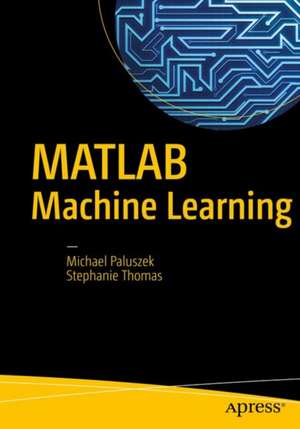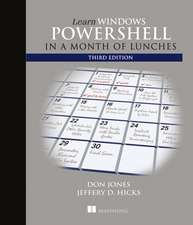MATLAB Machine Learning
Autor Michael Paluszek, Stephanie Thomasen Limba Engleză Paperback – 29 dec 2016
This book is a comprehensive guide to machine learning with worked examples in MATLAB. It starts with an overview of the history of Artificial Intelligence and automatic control and how the field of machine learning grew from these. It provides descriptions of all major areas in machine learning.
The book reviews commercially available packages for machine learning and shows how they fit into the field. The book then shows how MATLAB can be used to solve machine learning problems and how MATLAB graphics can enhance the programmer’s understanding of the results and help users of their software grasp the results.
Machine Learning can be very mathematical. The mathematics for each area is introduced in a clear and concise form so that even casual readers can understand the math. Readers from all areas of engineering will see connections to what they know and will learn new technology.
What you'll learn:
- An overview of the field of machine learning
- Commercial and open source packages in MATLAB
- How to use MATLAB for programming and building machine learning applications
- MATLAB graphics for machine learning
- Practical real world examples in MATLAB for major applications of machine learning in big data
Who is this book for:
The primary audiences are engineers and engineering students wanting a comprehensive and practical introduction to machine learning.
Preț: 274.49 lei
Preț vechi: 343.11 lei
-20% Nou
Puncte Express: 412
Preț estimativ în valută:
52.53€ • 55.09$ • 43.73£
52.53€ • 55.09$ • 43.73£
Carte tipărită la comandă
Livrare economică 28 martie-03 aprilie
Preluare comenzi: 021 569.72.76
Specificații
ISBN-13: 9781484222492
ISBN-10: 1484222490
Pagini: 400
Ilustrații: XIX, 326 p. 140 illus., 74 illus. in color.
Dimensiuni: 178 x 254 x 18 mm
Greutate: 0.6 kg
Ediția:1st ed.
Editura: Apress
Colecția Apress
Locul publicării:Berkeley, CA, United States
ISBN-10: 1484222490
Pagini: 400
Ilustrații: XIX, 326 p. 140 illus., 74 illus. in color.
Dimensiuni: 178 x 254 x 18 mm
Greutate: 0.6 kg
Ediția:1st ed.
Editura: Apress
Colecția Apress
Locul publicării:Berkeley, CA, United States
Cuprins
1 Overview of Machine Learning.- 2 The History of Machine Learning.- 3 Software for machine learning.- 4 Representation of data for Machine Learning in MATLAB.- 5 MATLAB Graphics.- 6 Machine Learning Examples in MATLAB.- 7 Face Recognition with Deep Learning.- 8 Data Classification.- 9 Classification of Numbers Using Neural Networks.- 10 Kalman Filters.- 11 Adaptive Control.- 12 Autonomous Driving.- Bibliography.
Recenzii
“This book presents MATLAB implementation in machine learning. … subsections found in most chapters--‘Problem,’ ‘Solution,’ and ‘How It Works’--make this book an interesting read. Programming blocks in MATLAB are helpful to beginners and advanced learners, as well as graduate students and professionals working in various aspects of machine learning implementation. Most of the chapters conclude with a summary and references, and the book ends with an index.” (Computing Reviews, October, 2017)
Notă biografică
Michael Paluszek is the co-author of MATLAB Recipes published by Apress. He is President of Princeton Satellite Systems, Inc. (PSS) in Plainsboro, New Jersey. Mr. Paluszek founded PSS in 1992 to provide aerospace consulting services. He used MATLAB to develop the control system and simulation for the Indostar-1 geosynschronous communications satellite, resulting in the launch of PSS' first commercial MATLAB toolbox, the Spacecraft Control Toolbox, in 1995. Since then he has developed toolboxes and software packages for aircraft, submarines, robotics, and fusion propulsion, resulting in PSS' current extensive product line. He is currently leading an Army research contract for precision attitude control of small satellites and working with the Princeton Plasma Physics Laboratory on a compact nuclear fusion reactor for energy generation and propulsion. Prior to founding PSS, Mr. Paluszek was an engineer at GE Astro Space in East Windsor, NJ. At GE he designed the GlobalGeospace Science Polar despun platform control system and led the design of the GPS IIR attitude control system, the Inmarsat-3 attitude control systems and the Mars Observer delta-V control system, leveraging MATLAB for control design. Mr. Paluszek also worked on the attitude determination system for the DMSP meteorological satellites. Mr. Paluszek flew communication satellites on over twelve satellite launches, including the GSTAR III recovery, the first transfer of a satellite to an operational orbit using electric thrusters. At Draper Laboratory Mr. Paluszek worked on the Space Shuttle, Space Station and submarine navigation. His Space Station work included designing of Control Moment Gyro based control systems for attitude control. Mr. Paluszek received his bachelors in Electrical Engineering, and master's and engineer’s degrees in Aeronautics and Astronautics from the Massachusetts Institute of Technology. He is author of numerous papers and has over a dozen U.S. Patents.
Stephanie Thomas is the co-author of MATLAB Recipes, published by Apress. She received her bachelor's and master's degrees in Aeronautics and Astronautics from the Massachusetts Institute of Technology in 1999 and 2001. Ms. Thomas was introduced to PSS' Spacecraft Control Toolbox for MATLAB during a summer internship in 1996 and has been using MATLAB for aerospace analysis ever since. She built a simulation of a lunar transfer vehicle in C++, LunarPilot, during the same internship. In her nearly 20 years of MATLAB experience, she has developed many software tools including the Solar Sail Module for the Spacecraft Control Toolbox; a proximity satellite operations toolbox for the Air Force; collision monitoring Simulink blocks for the Prisma satellite mission; and launch vehicle analysis tools in MATLAB and Java, to name a few. She has developed novel methods for space situation assessment such as a numeric approach to assessing the general rendezvous problem between any two satellites implemented in both MATLAB and C++. Ms. Thomas has contributed to PSS' Attitude and Orbit Control textbook, featuring examples using the Spacecraft Control Toolbox, and written many software User's Guides. She has conducted SCT training for engineers from diverse locales such as Australia, Canada, Brazil, and Thailand and has performed MATLAB consulting for NASA, the Air Force, and the European Space Agency.
Caracteristici
A first to market practical guide for using MATLAB to write machine learning software Numerous worked examples spanning the field of machine learning and big data Comes with complete working MATLAB source code











